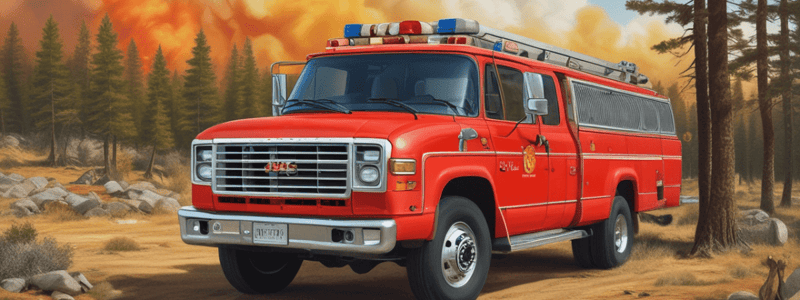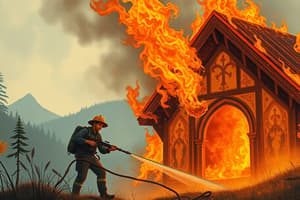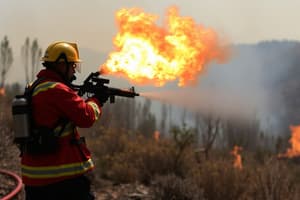Podcast
Questions and Answers
What essential elements must be included in the Arrival Report when responding to a wildland fire?
What essential elements must be included in the Arrival Report when responding to a wildland fire?
- Weather conditions
- Type of vegetation involved (correct)
- Estimated time of arrival
- Number of personnel on scene
Which Fire Attack method is considered the safest?
Which Fire Attack method is considered the safest?
- Flanking Attack (correct)
- Direct Attack
- Indirect Attack
- Surround and Suppress
What is the primary goal of the Indirect Attack strategy in wildland firefighting?
What is the primary goal of the Indirect Attack strategy in wildland firefighting?
- To protect exposures (correct)
- To cut off access routes
- To stop the fire's forward progress
- To create fire breaks
What critical factor should be monitored regarding the head of the fire during wildland operations?
What critical factor should be monitored regarding the head of the fire during wildland operations?
What should always be maintained during wildland fire operations in case of a wind change?
What should always be maintained during wildland fire operations in case of a wind change?
Which statement best describes the concept of the Direct Attack method?
Which statement best describes the concept of the Direct Attack method?
In the context of wildland fire operations, when should additional resources be requested?
In the context of wildland fire operations, when should additional resources be requested?
What is a typical action to be taken by personnel working within the burned portion of the fire?
What is a typical action to be taken by personnel working within the burned portion of the fire?
What should be utilized as fire breaks when natural barriers are inadequate?
What should be utilized as fire breaks when natural barriers are inadequate?
Which of the following is most effective for extinguishing a fire?
Which of the following is most effective for extinguishing a fire?
Which term best describes the purpose of LCES in wildland fire safety?
Which term best describes the purpose of LCES in wildland fire safety?
When is the use of a Self Contained Breathing Apparatus (SCBA) warranted?
When is the use of a Self Contained Breathing Apparatus (SCBA) warranted?
What is a key component of using foam in fire suppression?
What is a key component of using foam in fire suppression?
What common issue must responders be cautious of when operating in wildland fire scenarios?
What common issue must responders be cautious of when operating in wildland fire scenarios?
What is the main role of backfiring in fire control operations?
What is the main role of backfiring in fire control operations?
Which equipment should be utilized if long pumping operations are required?
Which equipment should be utilized if long pumping operations are required?
Which item is essential for personnel to wear while operating in a firefighting environment?
Which item is essential for personnel to wear while operating in a firefighting environment?
What should be done to prevent overheating during firefighting operations?
What should be done to prevent overheating during firefighting operations?
During thunderstorms, which safety measure should be followed while operating close to wildfires?
During thunderstorms, which safety measure should be followed while operating close to wildfires?
How often should personnel be rotated during extended firefighting operations?
How often should personnel be rotated during extended firefighting operations?
What initial action should the first arriving unit take at an incident?
What initial action should the first arriving unit take at an incident?
Which type of protective pants are recommended for firefighters?
Which type of protective pants are recommended for firefighters?
What is one action that should NOT be taken when facing lightning during operations?
What is one action that should NOT be taken when facing lightning during operations?
What is a recommended action after prolonged firefighting efforts to assist personnel?
What is a recommended action after prolonged firefighting efforts to assist personnel?
During emergency response, which resource may provide additional information about hydrant availability?
During emergency response, which resource may provide additional information about hydrant availability?
What should be included in the response to Wildland fires?
What should be included in the response to Wildland fires?
Why might the first arriving unit request additional units?
Why might the first arriving unit request additional units?
What is a reason for additional units to respond during the dry brush season?
What is a reason for additional units to respond during the dry brush season?
What is the primary responsibility of the Incident Commander regarding personnel safety?
What is the primary responsibility of the Incident Commander regarding personnel safety?
Which factor is NOT considered when requesting the Division of Forestry's assistance?
Which factor is NOT considered when requesting the Division of Forestry's assistance?
What is a critical personal protective measure for firefighters operating off Brush Trucks?
What is a critical personal protective measure for firefighters operating off Brush Trucks?
What is the main purpose of ensuring benchmarks are communicated during an incident?
What is the main purpose of ensuring benchmarks are communicated during an incident?
Which of the following actions should NOT be taken by firefighters according to their responsibilities?
Which of the following actions should NOT be taken by firefighters according to their responsibilities?
What role does the Water Supply Officer play during a wildland fire incident?
What role does the Water Supply Officer play during a wildland fire incident?
Which communication protocol is essential for each Company Officer?
Which communication protocol is essential for each Company Officer?
When is it appropriate to request a single unit resource during wildland fire incidents?
When is it appropriate to request a single unit resource during wildland fire incidents?
What aspect of the fire is most important for informing decision-making?
What aspect of the fire is most important for informing decision-making?
Which of the following best describes the term 'head of the fire'?
Which of the following best describes the term 'head of the fire'?
Why is understanding the direction of the fire's spread important?
Why is understanding the direction of the fire's spread important?
Which factor is essential for predicting the speed of a fire's spread?
Which factor is essential for predicting the speed of a fire's spread?
Why is it vital to track both the direction and speed of the fire?
Why is it vital to track both the direction and speed of the fire?
Why is the movement of the fire important?
Why is the movement of the fire important?
Which tactical consideration is MOST crucial when initiating a flanking attack on a rapidly spreading wildland fire?
Which tactical consideration is MOST crucial when initiating a flanking attack on a rapidly spreading wildland fire?
When employing a Direct Attack, what is a primary objective for firefighters?
When employing a Direct Attack, what is a primary objective for firefighters?
Which of the following best describes the mode of operation during a Direct Attack?
Which of the following best describes the mode of operation during a Direct Attack?
What does a Direct Attack typically require to be successful?
What does a Direct Attack typically require to be successful?
What is the most critical factor for the safety of firefighters during a Direct Attack?
What is the most critical factor for the safety of firefighters during a Direct Attack?
Which mode of operation best describes an Indirect Attack?
Which mode of operation best describes an Indirect Attack?
What is the primary objective of an Indirect Attack strategy?
What is the primary objective of an Indirect Attack strategy?
What action is most indicative of an indirect attack method?
What action is most indicative of an indirect attack method?
During an indirect attack, what takes priority?
During an indirect attack, what takes priority?
Which of the following best describes the function of a Indirect Attack?
Which of the following best describes the function of a Indirect Attack?
What is the recommended distance to wet down fuels from the control line during mop up?
What is the recommended distance to wet down fuels from the control line during mop up?
What is the main purpose of mopping up a wildland fire?
What is the main purpose of mopping up a wildland fire?
Which of these actions describes 'mopping up'?
Which of these actions describes 'mopping up'?
What is the primary target during mop up operations?
What is the primary target during mop up operations?
Why is wetting down fuels important during the mop up phase?
Why is wetting down fuels important during the mop up phase?
During mop up, what defines the area of focus for extinguishing fuels?
During mop up, what defines the area of focus for extinguishing fuels?
What should be done with all fuels within the specified mop up distance?
What should be done with all fuels within the specified mop up distance?
What is the ultimate goal of wetting down fuels during mop up operations?
What is the ultimate goal of wetting down fuels during mop up operations?
What is the recommended interval for rotating firefighting personnel during continuous operations?
What is the recommended interval for rotating firefighting personnel during continuous operations?
What is the guideline for personnel rotation to mitigate fatigue during firefighting?
What is the guideline for personnel rotation to mitigate fatigue during firefighting?
What is the established practice for personnel rotation during intense firefighting operations?
What is the established practice for personnel rotation during intense firefighting operations?
Flashcards
First Unit Arrival Requests
First Unit Arrival Requests
Can request additional support based on conditions.
Task Force Composition
Task Force Composition
Wildland fire response should include the response of both the Brush Truck and the Engine as a combined Task Force. The Company Officer may elect to respond on either unit.
During Dry Brush Season
During Dry Brush Season
additional units may respond per the Communication Center Protocols.
The need for additional assistance should be
The need for additional assistance should be
Signup and view all the flashcards
Wildland fires have three types of Fire Attack:
Wildland fires have three types of Fire Attack:
Signup and view all the flashcards
Flanking Attack
Flanking Attack
Signup and view all the flashcards
Direct Attack
Direct Attack
Signup and view all the flashcards
Indirect Attack
Indirect Attack
Signup and view all the flashcards
Escape Routes
Escape Routes
Signup and view all the flashcards
Natural Barriers
Natural Barriers
Signup and view all the flashcards
Burn Out Method
Burn Out Method
Signup and view all the flashcards
Class A Foam
Class A Foam
Signup and view all the flashcards
Mop Up Requirements
Mop Up Requirements
Signup and view all the flashcards
The terms LCES are important safety considerations in Wildland fires:
The terms LCES are important safety considerations in Wildland fires:
Signup and view all the flashcards
PPE Requirements; Personnel working at a Wildland fire should wear wildland gear.
PPE Requirements; Personnel working at a Wildland fire should wear wildland gear.
Signup and view all the flashcards
Rehabilitation
i. Drinking water should be provided immediately to prevent dehydration.
ii. During extended operations:
Rehabilitation i. Drinking water should be provided immediately to prevent dehydration. ii. During extended operations:
Signup and view all the flashcards
Thunderstorms
i. Operating on a Wildland fire during thunderstorms requires the following safety considerations:
Thunderstorms i. Operating on a Wildland fire during thunderstorms requires the following safety considerations:
Signup and view all the flashcards
Water application is more effective when applied to
Water application is more effective when applied to
Signup and view all the flashcards
The Incident Commander should:
- Obtain frequent weather updates to anticipate changing conditions.
- Request aerial recon (this may be performed by Law Enforcement
helicopter or a Fire Rescue drone).
The Incident Commander should:
- Obtain frequent weather updates to anticipate changing conditions.
- Request aerial recon (this may be performed by Law Enforcement helicopter or a Fire Rescue drone).
Signup and view all the flashcards
Company Officers Duties
Company Officers Duties
Signup and view all the flashcards
Firefighter Responsibilities
Firefighter Responsibilities
Signup and view all the flashcards
Firefighters shall not:
Firefighters shall not:
Signup and view all the flashcards
During Wildland fire operations, an
During Wildland fire operations, an
Signup and view all the flashcards
The location and movement (direction and speed) of the head of the fire
The location and movement (direction and speed) of the head of the fire
Signup and view all the flashcards
The first arriving unit shall give an Arrival Report. In addition, the Arrival Report shall include:
The first arriving unit shall give an Arrival Report. In addition, the Arrival Report shall include:
Signup and view all the flashcards
Flanking Attack Defined
Flanking Attack Defined
Signup and view all the flashcards
Direct Attack Strategy
Direct Attack Strategy
Signup and view all the flashcards
Indirect Attack Definition
Indirect Attack Definition
Signup and view all the flashcards
Exposure Protection
Exposure Protection
Signup and view all the flashcards
Defensive Mode in Firefighting
Defensive Mode in Firefighting
Signup and view all the flashcards
Mop Up
Mop Up
Signup and view all the flashcards
Personnel Rotation Frequency
Personnel Rotation Frequency
Signup and view all the flashcards
Whenever possible, apparatus and personnel should operate from
Whenever possible, apparatus and personnel should operate from
Signup and view all the flashcards
e. Always be prepared to move apparatus quickly in the event of a wind change.
f. Be alert and use extreme caution to prevent or minimize the chance of:
e. Always be prepared to move apparatus quickly in the event of a wind change. f. Be alert and use extreme caution to prevent or minimize the chance of:
Signup and view all the flashcards
Study Notes
- Establishes a standard action course for Wildland fire control.
- Authority lies with the Fire Rescue Administrator.
Response Protocol
- Communication Center may provide key details like hydrant locations during response.
- First unit arriving can request additional support based on conditions, area knowledge, water supply, or unusual circumstances.
- Response includes both Brush Truck and Engine as a combined Task Force.
- Additional units may be dispatched during dry brush seasons based on protocols.
Arrival Report Requirements
- First arriving unit must deliver an Arrival Report detailing:
- Acreage involved, access routes, fire spread direction, exposures, and vegetation type.
- May request extra resources through Communication Center early in the incident.
Wildland Fire Tactical Considerations
- Monitor fire head’s location and movement for critical decision-making.
- The location and movement (direction and speed) of the head of the fire is a critical factor in all other decisions.
- Three types of Fire Attack:
- Flanking Attack: Offensive, safest method, works from anchor point to fire head:
- Offensive Mode
- Safest method
- Working along the flanks from an anchor point towards the head of the fire.
- Direct Attack: Offensive, most dangerous, halts rapidly advancing fire:
- Offensive Mode
- Most dangerous method
- Requires a stop of the forward progress of a rapidly advancing fire.
- Indirect Attack: Defensive, focuses on exposure protection, controls fire burn area:
- Defensive Mode
- Exposure protection is primary goal
- Allow the fire to burn to a location better suited for fire control, while protecting exposures
- Maintain escape routes and be ready to relocate apparatus quickly.
- Utilize natural barriers like roads for fire breaks; use Division of Forestry for control lines where needed.
- Burn Out method for fuel consumption inside control lines, used by experienced personnel.
- Employ Class A foam for improved suppression effectiveness.
- Personnel must mop up within 50 feet of control lines for complete fire extinguishment.
- To ensure the fire is extinguished, personnel should mop up the incident by wetting down all fuels within fifty (50) feet of the control line.
Safety Considerations
- Adhere to LCES (Lookouts, Communication, Escape Routes, Safety Zones) for safety.
- Personal Protective Equipment (PPE) must include helmet, gloves, bunker or forestry pants, structural boots, and optionally bunker coats or forestry jackets.
- Provides hydration and establishes rehabilitation during extended operations; unit rotation every 30 minutes is recommended.
- If necessary, personnel should be rotated every thirty (30) minutes.
- Follow specific safety measures during thunderstorms, such as avoiding grouping and taking cover in vehicles.
Responsibilities
- First Arriving Unit: Establishes Incident Command and assesses scene size to determine resource needs.
- Incident Command: Manages the incident, ensures benchmarks and communication, assigns Incident Safety Officer, and oversees personnel safety and accountability.
- Company Officers: Responsible for communication of benchmarks and progress.
- Firefighters: Ensure they operate safely, carry fire shelters with Brush Trucks, and remain in view of truck drivers. Restrictions include no riding on booster tanks.
Studying That Suits You
Use AI to generate personalized quizzes and flashcards to suit your learning preferences.




